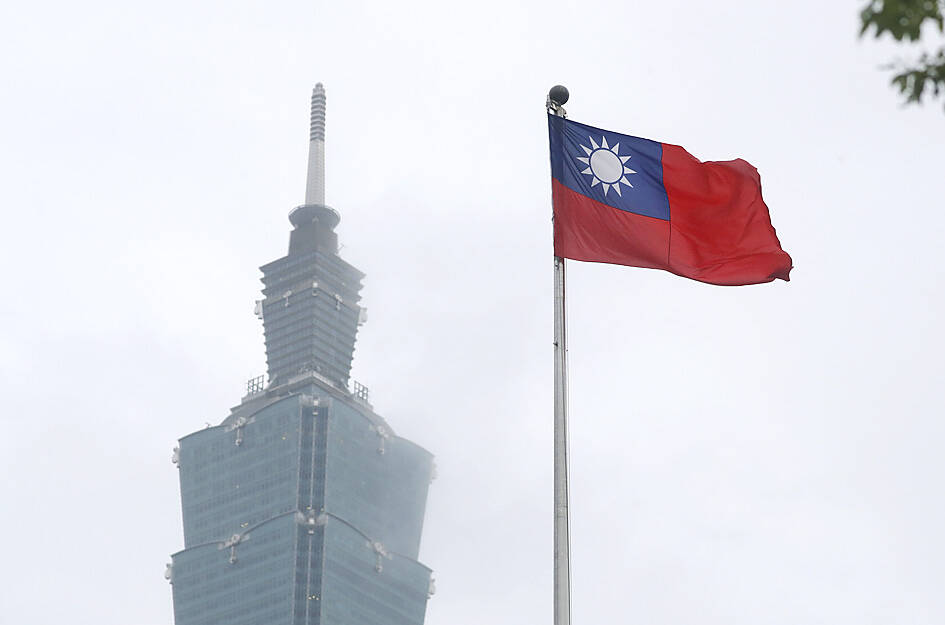Taiwanese banks’ fast disappearance from loan deals with Chinese companies is the latest indication of a collective effort to cut exposure to the world’s second-largest economy as the Chinese housing crisis rages on and geopolitical tensions linger.
The participation rate of Taiwanese lenders, defined by their involvement in any syndicated or club loan to Chinese company borrowers, has dropped to a record low of 1.7 percent this year, according to a Bloomberg-compiled data series dating back to 2010. The rate peaked at nearly 33 percent in 2013, before falling to 4 percent last year.
The slump reflects a broader move by Taiwan’s financial institutions, including industry leader Fubon Financial Holding Co (富邦金控), to reduce taking risks in an ailing Chinese economy, a process expedited by the COVID-19 pandemic and China’s ongoing property woes.

Photo: AP
The retreat coincides with the run-up to the Taiwan presidential election in January, which is set to be one the most fractured races ever and might reshape the region’s geopolitical landscape.
Several Hong Kong-based loan bankers at Taiwanese lenders told Bloomberg that participating in China deals would be challenging due to stricter credit approval and instructions from headquarters to reduce risks.
Many lenders have turned to markets such as Australia and Southeast Asia to look for business, said the bankers, who have asked not to be identified.
“Geopolitical risk is definitely on the radar after the US-China trade war, but slower economic growth, higher credit risks and more intense competition are also the reasons behind the pullout from the market,” Natixis SA senior economist Gary Ng (吳卓殷) said.
However, the retreat of Taiwanese banks might not have a major impact on China’s offshore credit market as borrowers have alternative sources of funding, according to Ng.
China still commands the largest share of syndicated loans in the Asia-Pacific excluding Japan so far this year, with companies from the country having received US$126 billion of financing, down from US$152 billion in the same period last year, Bloomberg data show.

Taiwan Semiconductor Manufacturing Co (TSMC, 台積電) would not produce its most advanced technologies in the US next year, Minister of Economic Affairs J.W. Kuo (郭智輝) said yesterday. Kuo made the comment during an appearance at the legislature, hours after the chipmaker announced that it would invest an additional US$100 billion to expand its manufacturing operations in the US. Asked by Taiwan People’s Party Legislator-at-large Chang Chi-kai (張啟楷) if TSMC would allow its most advanced technologies, the yet-to-be-released 2-nanometer and 1.6-nanometer processes, to go to the US in the near term, Kuo denied it. TSMC recently opened its first US factory, which produces 4-nanometer

PROTECTION: The investigation, which takes aim at exporters such as Canada, Germany and Brazil, came days after Trump unveiled tariff hikes on steel and aluminum products US President Donald Trump on Saturday ordered a probe into potential tariffs on lumber imports — a move threatening to stoke trade tensions — while also pushing for a domestic supply boost. Trump signed an executive order instructing US Secretary of Commerce Howard Lutnick to begin an investigation “to determine the effects on the national security of imports of timber, lumber and their derivative products.” The study might result in new tariffs being imposed, which would pile on top of existing levies. The investigation takes aim at exporters like Canada, Germany and Brazil, with White House officials earlier accusing these economies of

Teleperformance SE, the largest call-center operator in the world, is rolling out an artificial intelligence (AI) system that softens English-speaking Indian workers’ accents in real time in a move the company claims would make them more understandable. The technology, called accent translation, coupled with background noise cancelation, is being deployed in call centers in India, where workers provide customer support to some of Teleperformance’s international clients. The company provides outsourced customer support and content moderation to global companies including Apple Inc, ByteDance Ltd’s (字節跳動) TikTok and Samsung Electronics Co Ltd. “When you have an Indian agent on the line, sometimes it’s hard

‘SACRED MOUNTAIN’: The chipmaker can form joint ventures abroad, except in China, but like other firms, it needs government approval for large investments Taiwan Semiconductor Manufacturing Co (TSMC, 台積電) needs government permission for any overseas joint ventures (JVs), but there are no restrictions on making the most advanced chips overseas other than for China, Minister of Economic Affairs J.W. Kuo (郭智輝) said yesterday. US media have said that TSMC, the world’s largest contract chipmaker and a major supplier to companies such as Apple Inc and Nvidia Corp, has been in talks for a stake in Intel Corp. Neither company has confirmed the talks, but US President Donald Trump has accused Taiwan of taking away the US’ semiconductor business and said he wants the industry back